|
|
|
Sort Order |
|
|
|
Items / Page
|
|
|
|
|
|
|
| Srl | Item |
| 1 |
ID:
110522


|
|
|
| 2 |
ID:
093374
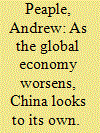

|
|
|
| 3 |
ID:
104101
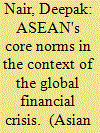

|
|
|
|
|
| Publication |
2011.
|
| Summary/Abstract |
Has the global financial and economic crisis provided stimulus for institutional development in ASEAN? Exploring the empirical trends concerning ASEAN's plans for a comprehensive community by 2015, it is a argued that no such developments have emerged. Instead, two alternative sources for potential change in ASEAN's institutional norms are elaborated
|
|
|
|
|
|
|
|
|
|
|
|
|
|
|
|
| 4 |
ID:
120670
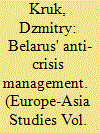

|
|
|
|
|
| Publication |
2013.
|
| Summary/Abstract |
The response of Belarus to the global economic crisis was shaped by a number of distinctive features of the Belarusian economy and of the economic policies implemented before the crisis. The specifics of anti-crisis management in Belarus resulted in a distribution of output losses for a number of subsequent periods and delayed recession. The scenario of stabilisation policies in Belarus can therefore be regarded as ineffective. The core reasons for this are an inappropriate choice of policy instruments and delayed exit from stabilisation policy. It is argued that this policy mix has long-term implications, including worsening economic growth prospects.
|
|
|
|
|
|
|
|
|
|
|
|
|
|
|
|
| 5 |
ID:
127492
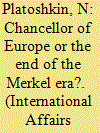

|
|
|
|
|
| Publication |
2013.
|
| Summary/Abstract |
IN GERMANY and outside it, the media spoke and wrote about the results of the German federal elections of September 22, 2013 as a personal triumph of Angela Merkel, the FRG Chancellor since 2005. Journalists hastened to tag her the "Chancellor of Europe." But was she really?
In 2009 and 2013, Angela Merkel led her party to federal elections under the slogan of a right-center coalition (which she personally preferred) with the liberal Free Democratic Party (FDP) which had moved further right on economic issues. In 2009, the German burghers frightened to death by the global financial crisis and financial collapse of several of the Eurozone countries preferred not to change horses in midstream: they voted Merkel. The 2009 elections, however, are better described as a triumph of Free Democrats who showed the historically best 14.8%. Those who voted FDP believed that the "bourgeois-minded" parties are much better suited to look after the country's economy than the "spendthrift" left. The FDP even promised lower taxes on businesses and natural persons.
|
|
|
|
|
|
|
|
|
|
|
|
|
|
|
|
| 6 |
ID:
089146
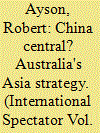

|
|
|
|
|
| Publication |
2009.
|
| Summary/Abstract |
From Australia's perspective, and in spite of the global economic crisis, an increasingly strong China will remain the dominant theme in Asia's evolving distribution of power. Australia has benefited from the prosperity which is the foundation of China's rise. But it continues to value the reassurance that a strong United States can bring to Asia. This favourable status quo seems superior to the alternatives: a cooperative Asian community which may be more aspirational than practicable; an Asian concert which requires an unlikely sharing of leadership between the great powers; or a coalition of Asian democracies which could be especially divisive. But as this comfortable status quo is strained, Australia may need to consider geopolitical options which until now have appeared fanciful and risky.
|
|
|
|
|
|
|
|
|
|
|
|
|
|
|
|
| 7 |
ID:
126454


|
|
|
|
|
| Publication |
2013.
|
| Summary/Abstract |
The global economic crisis revealed China to be an interdependent giant, one whose 'rise' was undeniable but also one whose deepening participation in transnational production sharing and network trade made it highly susceptible to an external shock. China weathered the storm relatively well - avoiding a recession, in particular - not because it had 'decoupled' from the G7 economies but because its stimulus measures were unusually swift and powerful. One cost, however, has been a worsening domestic imbalance between investment and consumption that carries a heightened risk of asset price inflation, non-performing loans and destabilising levels of local government debt. Meanwhile, China's ties to the world economy have not fundamentally changed since the crisis began. Despite stirring leader rhetoric and summit declarations, the BRICS have made only modest progress in meeting their goals. East Asia, North America and Europe remain China's principal trade partners, and cross-border production chains connecting these regions remain the dominant mode of China's incorporation into the world economy.
|
|
|
|
|
|
|
|
|
|
|
|
|
|
|
|
| 8 |
ID:
146715


|
|
|
|
|
| Contents |
This paper dissects the current global economic crisis and its causes and consequences in the Americas and Europe. It notes that from the beginning of the present century onwards, the left wing governments that were elected in much of South America improved the lot of the poorest sections of society but did not curb the power of the entrenched business elites and landowning oligarchies in a context of economic decline and malaise. The dysfunctional democratic system of Brazil and the influence of the reactionary upper classes served by the media and supported by neoconservative Pentecostal evangelist churches, led to the overthrow of President Dilma Rousseff in a soft coup aiming to restore fiscal austerity and liberal economic policies.
|
|
|
|
|
|
|
|
|
|
|
|
|
|
|
|
| 9 |
ID:
110021
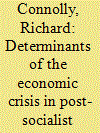

|
|
|
|
|
| Publication |
2012.
|
| Summary/Abstract |
After enjoying a period of sustained economic growth that saw the region converge with EU per capita income levels, the global economic crisis caused post-socialist Europe to suffer a larger decline in output during 2008-2009 than any other region in the world. While there was considerable variation in individual countries' experience of the crisis, this article argues that the severity of the crisis can be explained by three key macro-financial variables. The analysis suggests that alternative explanations focusing on other macroeconomic vulnerabilities, institutional weaknesses or trade vulnerabilities are of little explanatory utility.
|
|
|
|
|
|
|
|
|
|
|
|
|
|
|
|
| 10 |
ID:
091457
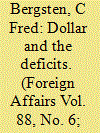

|
|
|
|
|
| Publication |
2009.
|
| Summary/Abstract |
The global economic crisis has revealed the folly of large U.S. budget and trade deficits, as well as of the strong dollar that makes them possible. If it is serious about recovery, the United States must balance the budget, stimulate private saving, and embrace a declining dollar.
|
|
|
|
|
|
|
|
|
|
|
|
|
|
|
|
| 11 |
ID:
091844
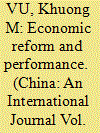

|
|
|
|
|
| Publication |
2009.
|
| Summary/Abstract |
Since the launch of economic reforms in China in 1978 and Vietnam in 1986, both countries have made impressive achievements. However, the two countries have experienced a notable divergence in growth, even though the context and characteristics of their reforms were broadly similar.
|
|
|
|
|
|
|
|
|
|
|
|
|
|
|
|
| 12 |
ID:
153677


|
|
|
|
|
| Summary/Abstract |
This paper examines the symbiotic but asymmetric relationship between the United States as the core and China as the semi-periphery. It argues that China’s policy response in both domestic and international domains after the global financial crisis reveals that China as a rising power is no longer a rule-taker, but between a rule-maker and a rule-breaker that adds incremental reforms to current international institutions.
|
|
|
|
|
|
|
|
|
|
|
|
|
|
|
|
| 13 |
ID:
102026
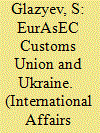

|
|
|
|
|
| Publication |
2010.
|
| Summary/Abstract |
AGAINST THE BACKGROUND of the global economic crisis, which has plunged the developed countries into a depression, we are witnessing the emergence of new centers of the world economy: China, Brazil and India. With the formation of a new technological order, they are emerging on the back of another long wave of economic growth. The world financial system is turning into a multi-currency one, and unipolar globalization is giving way to the creation of large regional economic unions. In the wake of the European Union, a huge ASEAN Free Trade Area is forming in Southeast Asia, the MERCOSUR Customs Union in South America, and NAFTA in North America. One of these integration arrangements in the Eurasian space is the Customs Union of the Republic of Belarus, the Republic of Kazakhstan and the Russian Federation.
|
|
|
|
|
|
|
|
|
|
|
|
|
|
|
|
| 14 |
ID:
122806
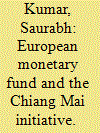

|
|
|
| 15 |
ID:
129536
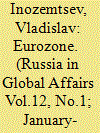

|
|
|
|
|
| Publication |
2014.
|
| Summary/Abstract |
The euro is a young currency that has all chances to make Europe a global player if the problems associated with its "premature birth" are solved in a decisive manner. The fiscal authorities should resort to extraordinary measures in order to accelerate economic growth, reduce unemployment, and boost the continent's competitiveness. For years the economic situation in Europe has been a matter of deep concern to politicians and economists. The European Union remains the largest economic power in the world, accounting for more than 20% of global gross product, possessing a huge export potential generating up to 16.4% of international trade with 161 of the world's top 500 companies, and with ample technological and financial resources. However, the EU economy is growing way too slow and its problems are becoming increasingly noticeable. The reason for this has been mentioned many times: poorly regulated public finance in the eurozone countries, which became particularly obvious during the global crisis of 2008-2009.
|
|
|
|
|
|
|
|
|
|
|
|
|
|
|
|
| 16 |
ID:
192625
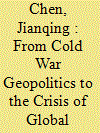

|
|
|
|
|
| Summary/Abstract |
This paper explores the genesis and growth of the current Chinese wireless network infrastructures by pulling together the historical threads of two telecommunications infrastructures: first, the development of the first-tier inter-provincial optical backbone, the “Eight Vertical and Eight Horizontal Fibre-optic Grid,” in the late 1980s and 1990s; and second, the deployment of two broadband-access cellular networks, the third-generation (3G) cellular networks in 2008 and the fourth-generation (4G) networks from 2013 to now, which constitute the wireless network's edges. I insert the development of Chinese wireless networks since the 1980s into the interconnected global technological environment, contextualizing the infrastructure deployment in the history of Sino-American technological cooperation and competition, traversing the final decade of the Cold War era (the 1980s), the dual global expansion of economic neoliberalism and informational technology since the 1990s and the crisis of global capitalism since 2008. This historical inquiry reconciles two historical (meta-)narratives that are not always compatible with each other – the Chinese narratives grounded on the overarching concept of Chinese post-socialism, and the narratives in Western discourses that often evoke Cold War/post-Cold War dialectics. This paper examines the global distribution of wireless network infrastructures on the basis of commercialization, technology transfers and trades of techno-commodities across borders, challenging the reduced depiction of the Chinese wireless network as an extension, or an exception, to the West-centred techno-capitalist system.
|
|
|
|
|
|
|
|
|
|
|
|
|
|
|
|
| 17 |
ID:
089815
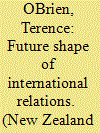

|
|
|
|
|
| Publication |
2009.
|
| Summary/Abstract |
This article reflects on the shape of 21st century world affairs. The impact of the current global financial crisis and economic crisis has exposed the inadequacies of international institutions. The traditional powers, whose negligence is largely responsible for the crisis, seem reluctant to share authority with the newly emergent economies upon whom the world must now rely for its recovery. The impacts of globalization, of greater militarization and weapons proliferation in international affairs, and of the dynamics of regionalism in international affairs, and of the dynamics of regionalism will all, however, shape a new hybrid order that will be more diverse and will require deeper understanding of forces like Islam that influence international relations. To be modern and successful in such a world, a country will not necessarily have to be Western.
|
|
|
|
|
|
|
|
|
|
|
|
|
|
|
|
| 18 |
ID:
130260


|
|
|
| 19 |
ID:
097644


|
|
|
| 20 |
ID:
087863
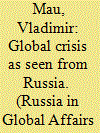

|
|
|
|
|
| Publication |
2009.
|
| Summary/Abstract |
The global economic crisis is rapidly growing and it is difficult to say yet how long it will last. Forecasting the future of this crisis is as senseless as forecasting crude oil prices. When they were high, the only thing one could say confidently was that prices would eventually fall some day. In much the same way, one can be sure now that the crisis will end one day, although neither when that will happen, nor the amount of damage, nor the layout of the post-crisis economy are known yet.
The crisis Russia went through in 1998 had domestic roots - a weak government incapable of conducting a responsible macroeconomic (budgetary, in the first place) policy. The current situation is markedly different: for the first time ever, this country is coming to grips with a world crisis as part of the global economic and financial system. This signifies that Russia is gradually turning into a normal market economy.
|
|
|
|
|
|
|
|
|
|
|
|
|
|
|
|
|
|
|
|
|